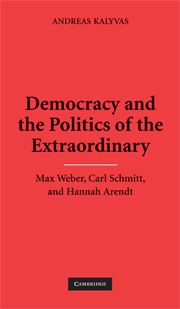Book contents
- Frontmatter
- Contents
- Acknowledgments
- List of Abbreviations
- Introduction: The Extraordinary and Political Theory
- I CHARISMATIC POLITICS AND THE SYMBOLIC FOUNDATIONS OF POWER
- 1 Revisiting Weber's Concept of the Political
- 2 Charismatic Politics
- 3 Disavowing Charismatic Politics
- II THE EXCEPTION AND CONSTITUTIONAL POLITICS
- III TAMING THE EXTRAORDINARY
- Conclusion: A Democratic Theory of the Extraordinary
- Bibliography
- Index
- References
3 - Disavowing Charismatic Politics
Published online by Cambridge University Press: 04 August 2010
- Frontmatter
- Contents
- Acknowledgments
- List of Abbreviations
- Introduction: The Extraordinary and Political Theory
- I CHARISMATIC POLITICS AND THE SYMBOLIC FOUNDATIONS OF POWER
- 1 Revisiting Weber's Concept of the Political
- 2 Charismatic Politics
- 3 Disavowing Charismatic Politics
- II THE EXCEPTION AND CONSTITUTIONAL POLITICS
- III TAMING THE EXTRAORDINARY
- Conclusion: A Democratic Theory of the Extraordinary
- Bibliography
- Index
- References
Summary
More than simply the heroic, supernatural properties of its leader, what makes a movement charismatic is mainly its ability to change the value system and ethical attitudes of its followers and supporters, to delegitimate the symbolic and normative foundation of the established political authority, to generate a new legitimation discourse, and to form a new collective will. In addition, it must relate the radical transformation of the instituted political and legal order with some emancipatory promises for the alleviation of the distress and suffering that the subordinated masses have experienced in the previous system of social organization.
Nowhere in his political studies, however, did Weber apply this model of charismatic politics to secular foundings. Nor did he refer to charismatic movements as modern instituting forces. And, most clearly, he abstained from systematically investigating the relationship of charismatic politics and democratic foundations, although in his later writings he did allude to certain affinities between charisma and democratic legitimacy. These omissions are puzzling. Equally surprising is the emphasis on the exceptional charismatic president and the heroic political demagogue as the only viable embodiments of charisma in liberal constitutional states. Most curiously, charisma, even in this personalistic version, is divested of its creative potentialities to be integrated into normal politics as part of the established constitutional order. The plebiscitarian Caesarist president of the Reich is neither a founder nor a legislator, but simply an institutional means for counterbalancing legal formalism, bureaucratic rule, instrumental rationality, weak parliaments, and the politics of interests.
- Type
- Chapter
- Information
- Democracy and the Politics of the ExtraordinaryMax Weber, Carl Schmitt, and Hannah Arendt, pp. 65 - 78Publisher: Cambridge University PressPrint publication year: 2008



